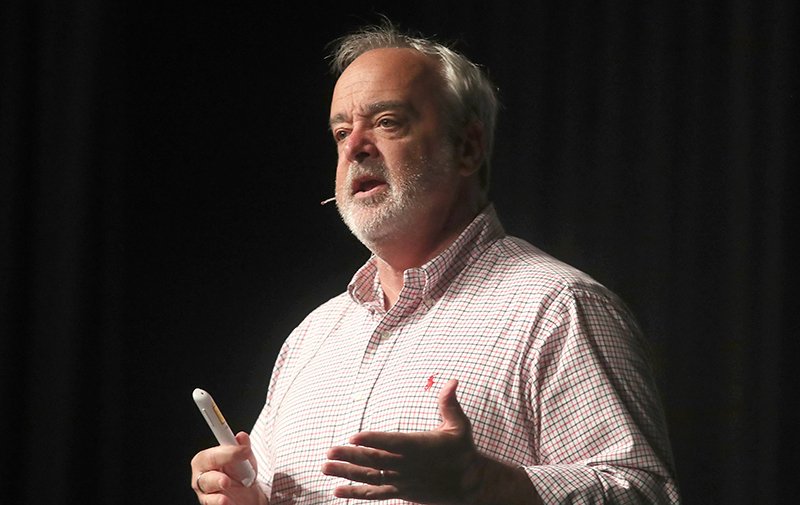Self-described "principal, dad, husband, public speaker, fun maker" and "America's Next Top Model: Educators' Season," Gerry Brooks, was Tuesday's keynote speaker at the 2019 Arkansas School Counselor Association's conference at the Hot Springs Convention Center.
Brooks, the principal of an elementary school in Lexington, Ky., has two decades of experience in education. He is also a public speaker who focuses on helping teachers "improve their instruction through personal climate and culture," and to help administrators "focus on how to lead all staff in a positive and constructive manner," according to his website.
Brooks' social media account features humorous, homemade videos inspired by his own experiences as an educator and administrator, several of which he employed during his address. He currently has over 500,000 followers on Twitter, Instagram, Facebook and YouTube.
"It's literally one of my favorite places that I get to speak because I truly believe that you are the lifeblood of the school. Without you, we would have huge, horrific problems. Math is important. Reading is important. But emotional stability is even more important," Brooks told the conference attendees.
"People just don't get what we're going through. They don't understand education today. We need to be with people who get that. We're dealing with things that we've never seen before. Now we have kindergartners throwing chairs when they're mad."
To combat these feelings of isolation, he encouraged counselors to network and make friends with other counselors who can understand their experiences and frustrations.
"You've got to find someone in your exact same position so that you'll have somebody who gets you," he said, stressing the importance of acceptance and getting along with co-workers.
"You know what are in our 25 different classes? Twenty-five different personalities. And you know what is running through our 150 middle school and high school classes? One hundred and fifty different personalities. You as the counselors have to step up and remind the teachers that you've got to be able to get along. Because guess what? There's a lot of people in the school you won't like. I've got 99 staff members on my staff this year, and guess how many personalities I have? One hundred and seven, because I have several myself," he said.
When handling issues among teachers or administrators, he recommended empathy. Consideration of people's own experiences and backgrounds can aid in understanding the actions they take, he said. In a conflict, he said he has found emphasizing a person's strengths and positive aspects have proven to be quite effective.
"That person that's driving you crazy? You're not going to change them. But you can change you, and you can start looking for their strengths," Brooks said.
"We've got to learn to accept people's mistakes. However, you accept someone's mistake is how they're going to accept your mistakes." He said this is especially true when interacting with students' parents.
Above all, Brooks said "being on the same page" in a school is vital to a healthy educational and professional environment.
"People say it's very hard to get on the same page. It's really not. Communication. That's the key to getting on the same page," because otherwise "climate culture problems" arise, he said.
"A school with people that are not on the same page will continue to go downhill in climate and culture and it will be a miserable place."
Brooks advocated a "share it or shut it," philosophy: address someone directly in a conflict rather than going over their head or speaking behind their backs.
"If you're having a problem with someone, go to that person. You need to have a confidante to share with. But when you go to a second person, you're gossiping. And when you go to a third person, you're just being a bully because you want to get a group of people to agree with you and be mad at that person. You are often that confidante," he said.
He also encouraged counselors to warn teachers to be cautious when discussing politics in schools, even among other teachers.
"If you decide to bring politics into your school, you could lose relationships with colleagues without even knowing it."
Brooks encouraged the counselors to take these initiatives on their own.
"You can change the climate and culture of your building. If you're waiting for your principal to do it, you'll be waiting forever."
He said changes to climate and culture do not require large, dramatic actions and could be as simple as keeping chocolate on one's desk. In fact, he said making chocolate available to teachers visiting his office is second in importance only to "being on the same page."
"That chocolate is amazing because it gives me the benefit of seeing teachers that I would never see," Brooks said. "I promise you, if you put chocolate on your desk, it's a game changer." To prove his point, he guaranteed that if the technique wasn't effective in a month and didn't "change relationships," he would reimburse anyone for chocolate they had purchased on his advice.
"It's small things like that that change climate and culture."
Other simple changes he recommended to improve the school as a professional environment included circulating communal, chain "compliment notebooks" among teachers and inquiring via email as to what each teacher's favorite snack and drink are, then keeping them on hand for trying days.
He warned that despite these and other efforts, "Everybody's not going to like you. Did you know that? And guess what? Your job is not for everyone to like you or to make everyone happy. It's not. There is always going to be someone that is not happy with a decision you make. Your goal is for everybody to respect you. That should be our goal as educators.
"Every decision you make should be made for kids. If every decision you make is for kids, they will respect you."
Local on 07/10/2019